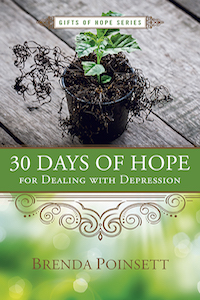Conversations
- Bible Studies (1)
- Books (14)
- Holiday Living (11)
- Christmas (8)
- Easter (1)
- Valentine's Day (1)
- Hope Builders (1)
- Prayer (5)
- Uncategorized (1)
-
Recent Posts
When I Met My Best Friend
May I tell you about my friend? You will not grow restless or tired from listening because the story has never grown old.
It all began when Jim, a pal of mine, introduced us. During the process of introduction, I was startled as Jim said, “Why don’t you two become friends?”
I’m a very curious person, and I wondered what was so important about this friend of Jim’s. Jim and I are usually frank with each other and so I asked him, “Why should we be friends?”
Jim put his hand on my shoulder and said, “Brenda, I know that you have many friends, but you can’t begin to realize the true meaning of friendship until you’ve had this person for a friend. Aren’t there things in your life that you’re ashamed of? Don’t you long for inner happiness?”
My eyes filled with tears, and I said, “Yes, Jim, I do, but how can your friend help me?”
Jim’s face shone with happiness as he said, “We realize that we’re not perfect and never will be, but my friend is. He was disliked by many who didn’t want His friendship. They saw to it that He was crucified. When He went to the cross, Brenda, He died for our sins; and now He wants your friendship.”
“I would like this friendship, Jim, but how do I go about it?”
Softly, he answered, “Simply trust Him, tell Him you need Him and want His friendship.”
I did, and instantly, my heart filled with joy, peace, and satisfaction. I knew without a doubt that He would be mine forever.
Since that time, He has walked beside me daily. He sings each song with me and listens to my pleas and heartaches. His understanding never ceases. I feel His presence even in the midst of deepest trials. The joy never stops surging in my soul.
But I can’t help wondering what He thinks of me. I know it took lots of love to be crucified for me, and each day His patience, grace, and mercy are tested by my actions. He must be deeply hurt when I refuse to introduce Him to my friends. Do you suppose He thinks I’m ashamed of Him whenever I’m talking to someone who doesn’t know Him and He keeps nudging my elbow and saying, “Introduce me, Brenda, introduce me to your friend”? I jerk my arm away and pretend I’m not listening. Then when we’re alone again, I realize what I have done. How could I have been so impolite to my best friend? It would have been so simple to say, “Would you like to meet my friend?”
I turn to Him and say, “Please forgive me. It will never happen again. I’m terribly sorry.”
As He remembers how I hurt Him, the smile leaves His face and the light goes out of His eyes, but soon He is smiling again, and I know everything will be all right.
I suppose by now you are wondering what His name is. He has many. They are Wonderful, Counselor, the Mighty God, the Everlasting Father, and the Prince of Peace. He has riches of gold and silver, but yet He will enter the poorest of hearts. He is a craftsman at His trade for this carpenter is building me a mansion in heaven. He is a master teacher with many students. He will never fail you if you become one of His students. He is the Son of the creator of the universe, and He will create a desire in your heart to serve Him. His name is above every name. His name is Jesus.
Download this article as a PDF.
©2022 Brenda Poinsett
Posted in Uncategorized
Comments Off on When I Met My Best Friend
You’ve Got It, I Want It
 Jealousy, envy, and coveting are seldom talked about emotions, but they need to be. Not knowing their characteristics and how they work can disturb a person’s heart. Any of one of these emotions can rob you of valuable inner space, steal your peace, and leave you dissatisfied with yourself. These feelings can even affect your relationship with God, but it doesn’t have to be this way. You can gain and grow through learning from biblical characters in You’ve Got It, I Want It—characters such as Eve, Cain, Sarah, Joseph’s brothers, Moses’ siblings, and David. Their experiences of dealing with jealousy, envy and coveting can help you recognize the power of wanting in your life, teach you how to deal with your feelings, and assist you in maintaining a tranquil heart.
Jealousy, envy, and coveting are seldom talked about emotions, but they need to be. Not knowing their characteristics and how they work can disturb a person’s heart. Any of one of these emotions can rob you of valuable inner space, steal your peace, and leave you dissatisfied with yourself. These feelings can even affect your relationship with God, but it doesn’t have to be this way. You can gain and grow through learning from biblical characters in You’ve Got It, I Want It—characters such as Eve, Cain, Sarah, Joseph’s brothers, Moses’ siblings, and David. Their experiences of dealing with jealousy, envy and coveting can help you recognize the power of wanting in your life, teach you how to deal with your feelings, and assist you in maintaining a tranquil heart.
Price: $13.00
Posted in Books
Comments Off on You’ve Got It, I Want It
What You’ll See from Where I Stand
 Give your Bible reading a boost with What You’ll See from Where I Stand. It offers a sweeping, compelling view of the whole Bible including the time between the testaments. This short book knits together major biblical events into one unbroken narrative. This will help you see the Bible’s big picture and find your place in it.
Give your Bible reading a boost with What You’ll See from Where I Stand. It offers a sweeping, compelling view of the whole Bible including the time between the testaments. This short book knits together major biblical events into one unbroken narrative. This will help you see the Bible’s big picture and find your place in it.
Price: $8.00
Posted in Books
Comments Off on What You’ll See from Where I Stand
Hope in the Midst of Depression
We can learn much through conversations with others. Today I’m talking with Terry Powell.
Terry, tell us about what you do.
For 36 years, I’ve taught Church Ministry and Bible teaching classes full time at Columbia International University in South Carolina. During those years, I’ve also served two stints, totaling 10 years, as half-time Director of Christian Education in my local church. Before coming to CIU, I served as a full-time DCE in a large Midwestern church. Once a year, I teach national leaders overseas. Writing is also something I do.
Yes, I’m aware of your writing because that’s how we first connected. I saw an article in a magazine that you had written about your struggle with depression. I have also experienced depression. I think that makes us kindred spirits.
What’s your experience with depression been like?
From early childhood to the present, the nemesis of depression has often enveloped me. Symptoms come and go. I’m not always depressed. Yet it’s rare to go more than a few months without a few rough days of walking in the darkness.
What symptoms do you experience?
For me, depression symptoms take one of two forms: (1) a robotic, listless, emotionally-numb state when motivation wanes, and my normal zest for living is at a low ebb. (2) Or the pendulum swings in the opposite direction. I have periods of heartache and hyper-sensitivity, causing me to weep at the slightest provocation. Symptoms usually accompanying a depressive episode include hopelessness, negative self-talk, an escalation of anxiety and impatience, overreactions to the normal stressors of life that all people face, and wishing for death (though I’ve never attempted suicide).
What causes your depressive episodes? And how do you deal with them?
In most instances I can’t pinpoint a specific reason for spiraling into depression. I normally see no correlation between circumstances and a day when I’m despondent. Yet when I’m already in a depressive episode, certain setbacks or relationship stressors worsen the symptoms and cause my mood to spiral farther down.
People with recurring depression often have a genetic predisposition for melancholy moods. I see ample evidence of this in my own family tree, especially on my mother’s side. This predisposition typically involves a depletion of brain chemicals necessary for normal neural functioning, such as serotonin, dopamine, or norepinephrine.
How do you fight the symptoms?
The primary means I’ve employed to alleviate the burden include Bible memory, heartfelt praying, support of close friends (including my wife), medical intervention, and the input of a professional Christian counselor. Personally, I consider medical help and counseling means of God’s “common grace” to man.
I wield a variety of weapons to fight for my joy. Yet since God hasn’t chosen to heal me of depression, I ask Him to use it redemptively.
How do you do that? How do you use your experience with depression in a redemptive way?
I now write and speak on depression.
Why do you want to write and speak on depression?
Four reasons pop into my mind:
(1) A myth persists among many Christians that depression stems directly from sin, anemic faith, or a failure to tap into God’s resources through spiritual disciplines such as prayer and Bible study. I want to dispel this myth, particularly in light of the growing evidence of a physical cause for depression in many cases.
There’s no correlation in my own life. I’ve felt buoyant in spirit on days when I neglect personal time with the Lord, and severely depressed on days that began with an unhurried quiet time that included confession of sin.
(2) Another misconception is that depression keeps a person from being fruitful in ministry. If that were true, how do we explain the fruitful ministry of past spiritual giants such as David Brainerd and Charles Spurgeon? To read their biographies is eye-opening. Both men struggled with depression. Spurgeon himself pointed out that God receives most glory through a needy person who clings to Him (see Psalm 50:15).
(3) Among many churches in the United States, a theology of suffering is especially shallow. Factors such as a consumer mindset and the proliferation of the health and wealth gospel have inadvertently led many people to equate suffering with God’s displeasure or with a lack of faith. Yet the Bible teems with verses that promise suffering for God’s people, with potential outcomes including greater intimacy with Him, deeper character, and expanded ministry to others who hurt. Representative of such texts are Psalm 34:18-19; John 16:33; James 1:2-4; and 1 Peter 4:12-16.
(4) I also want people to recognize that no matter what causes their depression, there is still a spiritual battle to face. It’s a battle of belief. Will I believe the lies Satan whispers when I’m in the throes of depression, or will I believe what the Bible teaches about the character of God and His promises for a brighter future? Will I rely on the Holy Spirit’s strength when depression increases my vulnerability to certain temptations? Or will I fight back with verses such as 2 Thessalonians 3:3? “But God is faithful, and He will strengthen and protect you from the evil one.”
A number of biblical characters struggled with depression. Do you identify with any particular one?
King David.
Why David? I don’t particularly see him as depressed.
In Psalm 13, David starts out with questions about God’s apparent abandonment of him. Yet a few verses later, David extols God’s loving kindness and alludes to past times when God had dealt bountifully with him. Focusing on God’s character and past experiences of His faithfulness instilled within David trust for the current crisis.
What I appreciate about him is how he dealt directly with God in times of crises or emotional upheaval. Whether foes threatened him or he felt abandoned by God, David’s raw emotions showed in the form of doubts and hard questions that show up in his prayers.
I’m not advocating showing disrespect to a holy God, yet David—and others such as Jeremiah suggest it’s okay to vent negative feelings to God. Perhaps such honesty gives a green light to the Spirit to change our thinking. Both men shifted to praise and to a focus on who God is and what He has done, but only after honest venting of negative attitudes.
I share your belief in the value of honest praying which I write about in my books on depression. When we are honest with God, we give Him a channel to come in and do a work of grace in our lives. Learning that was one of the valuable things to come out of my depression. While I wouldn’t want anybody to suffer from depression, it can turn out to be a valuable experience.
How do you view your experience? Do you consider it detrimental or beneficial or somewhere in between?
That’s a thoughtful question, Brenda. Without minimizing the inner horror of severe depression, I view my depression as beneficial.
One reason I do is my rock-solid belief in the sovereignty of God. If prayers and other means of grace haven’t obliterated my depression, and if medicine and counseling haven’t eradicated it, I’ve no choice but to believe that He intends it for my good and for His glory.
Years ago, through tears, I surrendered my depression to God in words similar to these:
“Father, if You choose not to lift this veil of darkness, I accept that. I belong to you. You are still good and loving. You know what You’re about. If this vulnerability to despondency always characterizes me, I’ll assume you have a reason. I’ll trust You to sustain me through the rough days, and to use me in spite of (or possibly, because of) it. What matters isn’t that others perceive me as weak, but that they see You—the One I desperately cling to—as strong.”
A second reason I see depression as beneficial is how it has expanded my ministry to hurting people. When I speak or write on the subject, people know I can identify with their pain, and I can put into words the despair they are experiencing. I can’t offer superficial solutions to such a complex condition, but I can testify that God’s resources dramatically help with the symptoms, and that He can still use them fruitfully in service.
I also convey tried-and-true strategies for enduring during a depressive episode. A few months ago I launched a new blog on depression and faith: penetratingthedarkness.com. The home page describes its purpose and direction. Near the bottom of the home page readers can click on a link to hear a 30-minute chapel testimony I gave at CIU in 2014, prompted by a student’s suicide. This link takes you to the blog:
https://www.penetratingthedarkness.com/
Brenda, thanks for the opportunity to share with your readers. And thank you for setting a valuable precedent yourself for writing on the subject of depression and faith. I’d welcome any of your readers who want to contact me at terry.powell@ciu.edu.
Posted in Hope Builders
Comments Off on Hope in the Midst of Depression
30 Days of Hope for Dealing with Depression
 If you are feeling sad, down in the dumps or have lost interest in life and things you used to enjoy, find understanding and encouragement in 30 Days of Hope for Dealing with Depression. Whatever form your depression takes, it gives you a feeling of hopelessness. That’s what this book can help you with. Through stories, Scripture, quotes and reflections, little by little, day by day, your hope can be revived and activated to where you can enjoy life once again.
If you are feeling sad, down in the dumps or have lost interest in life and things you used to enjoy, find understanding and encouragement in 30 Days of Hope for Dealing with Depression. Whatever form your depression takes, it gives you a feeling of hopelessness. That’s what this book can help you with. Through stories, Scripture, quotes and reflections, little by little, day by day, your hope can be revived and activated to where you can enjoy life once again.
Price: $10
Posted in Books
Comments Off on 30 Days of Hope for Dealing with Depression
He Did That?!: Jesus’ Amazing Acts for Women
 With this book, step back in time and see Jesus’ astonishing—and even sometimes bewildering—acts in Mark’s gospel. Reflect on His actions—what they meant then and what they mean now. As you do, your belief in miracles will be renewed, your sense of integrity strengthened, and your appreciation of His love increasing. You’ll exclaim, “Oh, my! I’m simply amazed at what Jesus did for me!”
With this book, step back in time and see Jesus’ astonishing—and even sometimes bewildering—acts in Mark’s gospel. Reflect on His actions—what they meant then and what they mean now. As you do, your belief in miracles will be renewed, your sense of integrity strengthened, and your appreciation of His love increasing. You’ll exclaim, “Oh, my! I’m simply amazed at what Jesus did for me!”
Posted in Books
Comments Off on He Did That?!: Jesus’ Amazing Acts for Women
Unshakeable Love, Unshakeable Faith
What Do You Say?
Whether you have been a Christ follower for a few weeks, a few years or decades, you have made some conclusions about the Christian life. You may not have actually stated those conclusions, but they have “been there” influencing your thinking and your way of life. If you were to summarize what’s most important in following Christ, what would you say?
Posted in Bible Studies
Comments Off on Unshakeable Love, Unshakeable Faith
How do you love yourself if you never have?
Jesus taught us, “Love the Lord your God with all your heart, with all your soul, with all your strength, and with all your mind, and love your neighbor as your love yourself” (Luke 10:27 TEV). Which part of this teaching do you find challenging? One woman was troubled by the “as you love yourself” part. She asked, “How do you love yourself if you never have?”
I assumed by her question that she wanted to feel better about herself, appreciate who she is and values what she can do. It is in this sense that she didn’t love herself.
Our feeling about ourselves can be changed if we are willing to do some work. Here are some things we might do.
Practice the first part of the second commandment—the “love your neighbor” part. When we get caught up in caring for and helping others, we take the focus on ourselves. We find what we do for others makes us feel better about ourselves. Think of what you can do for others. Whose life can you make better? What encouragement can you bring to the discouraged? Go on mission trips, visit nursing homes, teach Sunday school, visit the lonely . . . you get the picture. Put the focus of your attention on others, not on yourself, and the result will be that you will change how you feel about yourself.
Thank God for who you are and for your attributes. Be as specific as you can, and make it a habit of doing this everyday until you notice a change, and then thank God for changing you!
Quote Psalm 139:13-16 frequently throughout the day. Say it out loud as you drive to work or as you are doing dishes. Make it personal. Put your name in the verses when you say “You created every part of me (your name).” Say it before you go to bed at night and when you get up in the morning.
Surrender your negative thoughts to God in prayer and then affirm in prayer a picture of your loving yourself. Thoughts led to emotion, not the other way around. Identify what those negative thoughts are (Is it jealousy? Envy? Anger? Disgust?). Give these thoughts to God and then affirm what you want to see. Your affirmation could go something like this: “I see You, Lord, as smiling on me because You are pleased with me. You delight in who I am. You have meaning and purpose for my life. You value my service to You, and You take pleasure in watching over me.” Make this a morning exercise every day until you experience a change in your feelings.
Believe God has a purpose for your life—you with your unique attributes and in your particular situation have something special to offer. Begin to walk, to talk, and to act in acknowledgement of this purpose. You have a unique place to fill on this earth and when you acknowledge this, you will find yourself respecting who you are.
Have a conversation with Jesus by saying out loud both sides of a dialogue. I got this idea from Rosalind Rinker. It’s from her book Communicating Love Through Prayer (Grand Rapids, Michigan: Zondervan Publishing House, 1966). I quoted a version of this dialogue in my books He Said What?!: Jesus’ Amazing Words to Women and Prayerfully Yours. It goes something like this.
Brenda: Lord Jesus, are you right here with me?
Jesus: Yes, Brenda, I am here with you.
Brenda: Your love for me never changes, does it?
Jesus: No, my love for you never changes; I always have and I always will love you.
Brenda: But Lord, how can you love me? Most of the time I don’t even like myself. Jesus: I understand how you feel, but your insight about yourself is limited. I, however, love you for yourself. Believe me because I want to help you. You are my precious child.
Through the years, I’ve used this prayer exercise at times when I haven’t loved myself, and it never failed to help me. In fact, I’ve used all of these suggestions; that’s why I can heartily recommend them to you. I know they work, and if you put your heart and soul into it, they will help you, too. I want you to love yourself because God loves you.
Posted in Prayer
Comments Off on How do you love yourself if you never have?
“From the Heart” Valentine Ideas
Valentine’s Day, with its traditions of cupids, red roses, and heart-shaped boxes of candy, has usually been linked with romantic love in the past. Thankfully that has changed. It’s now also a time to connect with friends and family and to show you care. Here are some ideas for doing just that with your children and grandchildren.
Posted in Valentine's Day
Comments Off on “From the Heart” Valentine Ideas
Best Christmas Cookies Ever
What’s the one dessert you associate with Christmas? Blog radio host, Linda Kozar, asked me this question when interviewing me recently. Without hesitation, I said, “Ruth’s Chewy Oatmeal Fruit Cookies.”
This is our family’s favorite cookie, but we only make them once a year because they require a lot of effort and because they seem to go with Christmas. Maybe it’s the blend of sugars, raisins, dates, oatmeal, nuts, and coconut that prompts the association.
Interested? Here’s the recipe.
Cream together 1 cup brown sugar, 1 cup white sugar and 1 cup shortening. Add 2 large eggs, beaten with 1 teaspoon vanilla. Sift together 1 cup flour, 1/2 teaspoon salt and 1 teaspoon soda. Add to the creamed mixture, blending well. Then add 4 cups uncooked oatmeal, again blending well.
Grind 1 cup raisins and 1 cup pitted dates. Add those to mixture along with 1 cup chopped pecans and 1 cup coconut.
Drop by teaspoonfuls onto greased cookie sheets. Bake for about 10 minutes at 325-350 degrees. It is normal for the cookies to fall some after they are out of the oven so don’t worry that you’re done something wrong.
Grinding the dates and raisins does something that just cutting them up won’t do, so don’t skip this part. Just be sure you cream the sugars and shortening extremely well, until they go “plop” when dropped from a spoon. Do sift your flour even if your brand says it isn’t necessary. Some of the nonsifts have a very drying effect on cookie doughs where the only moisture is eggs. The mixture may then crumble to where you can’t make it hold together. Sifting is a small price to pay to ensure success. Even then, the dough is still drier than other cookies.
Why these cookies are called “Ruth’s,” I don’t know. I clipped this recipe from Nan Wiley’s column in the Kansas City Star years ago, and my husband Bob and I have been making them ever since. They are delicious, and we figure with oatmeal in the cookies, we can even eat them for breakfast!
Posted in Christmas, Holiday Living
Comments Off on Best Christmas Cookies Ever

